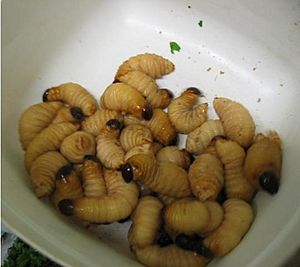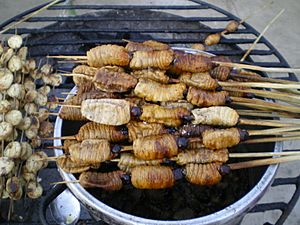Mojojoy facts for kids

Rhynchophorus ferrugineus larvae
|
|
| Place of origin | Colombia, Peru |
|---|---|
| Region or state | Amazon |
| Main ingredients | beetle larvae |
Mojojoy is the name for the larvae (young forms) of certain palm weevils. These grubs are found in the Amazon region of Colombia. People eat them as food, but they are also known to be a problem for different types of palm trees.
In Peru, these grubs are called suri or cocotero. People describe their taste in different ways. Some say they taste like hazelnuts, while others think they taste like butter. Mojojoy is also seen as a good example of a sustainable food source.
What is Mojojoy?
Mojojoy grubs are the young forms of beetles like Ancognatha scarabaeoides and Rhynchophorus palmarum. These beetles can sometimes harm plants. They might damage crops or affect trees by eating their roots.
The adult weevils dig into trees like the aguaje tree. They lay their eggs there. Once the eggs hatch, the young grubs eat the oily bark of the tree. Many people believe that this is why the grubs have a rich, fatty flavor.
How is Mojojoy Eaten?

Mojojoy can be eaten in different ways. Sometimes, people eat them raw. If eaten raw, the head, small pincers, and intestines are removed first.
Most often, Mojojoy is cooked. They can be roasted or fried. People also like to grill them on a skewer. Sometimes, they are even stuffed with beef, chicken, or fish.
One popular way to prepare them is in the anticucho style. This means they are soaked in a special liquid called a marinade and then grilled. Another dish is Chicharrón de suri. For this, the grubs are seasoned with salt and garlic. Then, they are fried, often served with green plantains.
Mojojoy Nutrition
These grubs are a great source of important nutrients. They provide a lot of protein, which helps your body grow strong. Mojojoy also contains vitamins A and E. These vitamins are good for your eyes and overall health. They also have beta-carotene, which your body turns into Vitamin A.
See also
 In Spanish: Mojojoy para niños
In Spanish: Mojojoy para niños
 | Anna J. Cooper |
 | Mary McLeod Bethune |
 | Lillie Mae Bradford |

